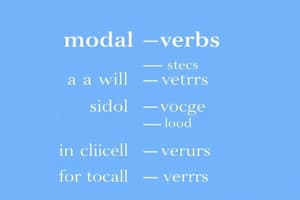Podcast
Questions and Answers
Which of the following best describes the use of could have, would have, and should have?
Which of the following best describes the use of could have, would have, and should have?
- Expressing future intentions
- Expressing regret about the present
- Expressing present feelings about a past decision (correct)
- Expressing uncertainty about the past
What is the main difference between simple past and past modals like could have, would have, and should have?
What is the main difference between simple past and past modals like could have, would have, and should have?
- Simple past is used for actions with certainty, while past modals are used for uncertain actions
- Simple past tells what happened, while past modals tell what could have, would have, and should have happened (correct)
- Simple past is used for actions in the distant past, while past modals are used for recent actions
- Simple past is used for positive events, while past modals are used for negative events
When forming past modals like could have, would have, and should have, which word is used for all pronouns?
When forming past modals like could have, would have, and should have, which word is used for all pronouns?
- 'Could', 'would', or 'should'
- Has
- Had
- Have (correct)
What does 'could have' imply?
What does 'could have' imply?
What do could have, would have, and should have work like according to the text?
What do could have, would have, and should have work like according to the text?
Flashcards
Past Modals: Expressing Past Feelings
Past Modals: Expressing Past Feelings
Past modal verbs like 'could have', 'would have', and 'should have' express feelings about past decisions.
Simple Past vs. Past Modals
Simple Past vs. Past Modals
Simple past tense describes what happened, while past modals like 'could have', 'would have', and 'should have' describe what could have happened.
Past Modals: 'Have' for All Pronouns
Past Modals: 'Have' for All Pronouns
The word 'have' is used for all pronouns when forming past modals ('could have', 'would have', 'should have').
Meaning of 'Could Have'
Meaning of 'Could Have'
Signup and view all the flashcards
Past Modals as a Time Machine
Past Modals as a Time Machine
Signup and view all the flashcards
Study Notes
Past Modals
- Could have, would have, and should have are used to express hypothetical or unreal situations in the past.
Simple Past vs. Past Modals
- Main difference: Simple past describes completed actions in the past, while past modals like could have, would have, and should have describe hypothetical or unreal situations in the past.
Forming Past Modals
- 'Have' is used for all pronouns when forming past modals like could have, would have, and should have.
'Could have'
- Implies: ability or possibility in the past, but the action didn't happen.
How Past Modals Work
- Could have, would have, and should have work like conditional sentences, describing hypothetical or unreal situations in the past.
Studying That Suits You
Use AI to generate personalized quizzes and flashcards to suit your learning preferences.




